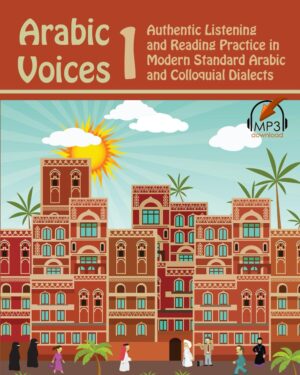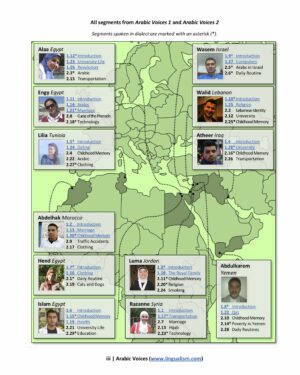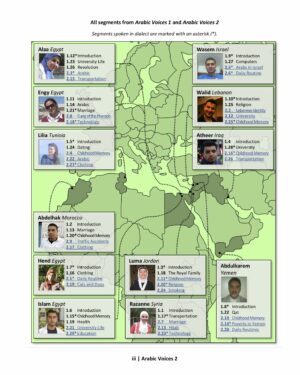Home » Modern Standard Arabic » The Curse of the Pharaohs–Engy
The Curse of the Pharaohs–Engy
| Peace, mercy, and blessings of God! [00:00.2] | السلام عليكم ورحمة الله وبركاته! | |
| Hello and welcome to another Arabic Voices video, your path to learning Arabic. [00:03.1] | أهلًا ومرحبًا بكم في فيديو آخر من فيديوهات Arabic Voices طريقك لتعلم العربية. | |
| Today we will talk about what Engy said about the curse of the pharaohs. We will comment on some of the different words and phrases she used. [00:10.5] | اليوم سنتحدّث عمّا قالته إنجي بشأن لعنة الفراعنة. سنقوم بالتعليق على بعض ما استخدمته من كلمات وعباراتٍ مختلفة. | |
| So let's start with line 4 on page 43, where Engy says, "In fact, there is no scientific definition or mention of this term in research." [00:21.5] | فهيّا بنا نبدأ بالسطر الرابع في الصفحة الثالثة وأربعون، حيث تقول إنجي: (في الحقيقة لا يوجد أي تعريف أو ذكر علمي لهذا المصطلح في الأبحاث). | |
| Here, Engy begins her talk by saying في الحقيقة (actually), and this is a phrase we use when we start talking about something we want to talk about frankly. [00:38.9] | فتبدأ إنجي هنا كلامها بقولها [في الحقيقة]، وهذه عبارة نستخدمها عند بداية الكلام عن شيء نريد الكلام فيه بصراحة. | |
| You can say في الحقيقة (actually); you can say بصراحة; you can say في الواقع. [00:51.0] | يمكنك أن تقول [في الحقيقة]، يمكنك أن تقول [بصراحة]، يمكنك أن تقول [في الواقع]. | |
| For example, you can say, "Actually, learning Arabic is not an easy thing; in fact, learning Arabic is not an easy thing," and so on. [00:57.8] | فمثلًا يمكنك أن تقول: (في الحقيقة تعلم اللغة العربية ليس بالأمر السهل، في الواقع تعلم اللغة العربية ليس بالأمر السهل)، وهكذا. | |
| في الحقيقة or في الواقع or you can also say بصراحة. And the first two are more telling than saying بصراحة. [01:11.0] | [في الحقيقة، في الواقع]، أو يمكنك كذلك أن تقول [بصراحة] وإن كان [في الحقيقة]، و[في الواقع] هما أبلغ من قولك [بصراحة]. | |
| Great! Then we move on to what she said on line 10, where she says, "which caused him to develop blood poisoning, and this led to him having a high fever, which led to his death." [01:24.4] | عظيم! بعد ذلك ننتقل إلى ما قالته في السطر العاشر، حيث تقول: (مما تسبب في إصابته بتَسمُّم في الدم، وأدّى ذلك إلى إصابته بحمّى شديدة، أدّت إلى وفاته). | |
| Engy here uses the verb أدّى (to lead to), and when using it, you usually use the preposition إلى with it; something that leads to something. [01:41.7] | وتستخدم إنجي هنا الفعل [أدّى]، وعند استخدام الفعل [أدّى]، غالبًا ما تستخدم معه حرف الجر [إلى]، شيئًا ما يؤدي إلى أمرٍ ما. | |
| For example, you can say, "The poison led to his death... the poison led to his death," so we often use the preposition إلى (to) with the verb أدّى، يؤدّي إلى. [01:56.1] | فيمكنك أن تقول مثلًا: (السُّم قد أدّى إلى وفاته… السُّم قد أدّى إلى وفاته)، فغالبًا ما نستخدم حرف الجر [إلى] مع الفعل [أدّى، يؤدّي إلى] | |
| Great! We then move on to line 14, where Engy says, "And on the day the gate was broken...the lock of the cemetery, a cobra crept in." [02:13.2] | عظيم! ننتقل بعد ذلك إلى السطر الرابع عشر، حيث تقول إنجي: (ويوم تم كسر قف… قفل المقبرة تسللت أفعى من نوع الكوبرا). | |
| Engy here uses the form تم, and as you can see after the word تم, Engy uses a masdar, and you can use this form when referring to if a verb… to that a verb… actually happened without mentioning the subject… without mentioning the subject which did this. [02:26.8] | تستخدم إنجي هنا صيغة [تم]، وكما ترى بعد كلمة [تم]، تستخدم إنجي [المصدر]، ويمكنك استخدام هذه الصيغة عند الإشارة إلى إن فعلٍ… إلى أن فعلٍ… فعلًا ما قد حدث بدون أن تذكر الفاعل… بدون أن تذكر الفاعل الذي قام بفعل هذا الأمر. | |
| She says, "The cemetery lock has been broken." She did not say who did this act. [02:51.0] | فهي تقول: (تم كسر قفل… قفل المقبرة)، لم تقل من قام بهذا الفعل. | |
| You can say, for example, "The request has been accepted... The request has been accepted." She did not mention the subject, but the important thing is that the request has been accepted, the subject here is unknown and not mentioned. This is because the subject may be inferred from the form of speech, or the subject is not important in the sentence. [02:58.6] | يمكنك أن تقول مثلًا: (تم قبول الطلب… تم قبول الطلب) أنت لم تذكر الفاعل، ولكن المهم أن الطلب قد قُبِل، وتُهمل الفاعل هنا ولا تذكره؛ وهذا بسبب أن الفاعل قد يُستنتج من صياغ الكلام، أو أن الفاعل ليس مهمًا في الجملة. | |
| The tomb lock has been broken." As you can see, you use تم and then the masdar. "The cemetery lock has been broken; the request has been accepted; the file has been uploaded," and so on. [03:22.8] | (تم كسر القفل المقبرة)، وكما ترى تستخدم [تم] وبعدها المصدر؛ (تم كسر قفل المقبرة، تم قبول الطلب، تم تحميل الملف)، وهكذا. | |
| Great! After that, we move to line 16, and here we would like to refer to something that was mentioned on line 13 and on line 18 as well, and it is a form in the Arabic language that we know as 'the passive voice.' [03:38.5] | عظيم! بعد ذلك ننتقل إلى السطر السادس عشر، وهنا نود الإشارة إلى أمرٍ قد ذُكر في السطر الثالث عشر وفي السطر الثامن عشر كذلك، وهي صيغة في اللغة العربية نعرفها بصيغة [المبني للمجهول]. | |
| And 'the passive voice' is a verb that is used without mentioning the subject. It is a verb that is used without mentioning the subject. On line 16 it says, "It is also said that when the seal of the cemetery was broken..." She says, "it is said that..." [04:00.3] | و[المبني للمجهول] هو فعل يُستخدم بدون ذكر الفاعل… هو فعل يُستخدم بدون ذكر الفاعل، ففي السطر السادس عشر تقول: (ويُقال أيضًا أن عند كسر ختم المقبرة) فهي تقول [يُقال أن]. | |
| On line 18 it says, "It is believed that the god Horus, who incarnates in the king's body, is a falcon." [04:20.5] | في السطر الثامن عشر تقول: (يُعتقد أن الإله حورس الذي يتجسد في جسد الملك عبارة عن صقر). | |
| She says يُقال أن (it is said that) or يُعتقد أن (is believed that) without mentioning the subject who 'believes,' or the subject who 'says,' then this we call in the Arabic language 'the passive structure.' [04:30.4] | فتقول [يُقال أن] أو [يُعتقد أن] بدون ذكر الفاعل الذي يعتقد، أو الفاعل الذي يقول، فهذا نسميه في اللغة العربية [مبني للمجهول]. | |
| And the passive voice is a verb that is used in a form that omits the subject, so do not mention the subject. For example, you say as Engy says here, "It was observed that there was a falcon… a falcon flying over the cemetery," and this is on line 13. [04:46.2] | و[المبني للمجهول] هو فعل يُستخدم في صيغة تُهمل الفاعل، فلا تذكر الفاعل، تقول مثلًا كما تقول هنا إنجي: (لُوْحِظ أن هناك صقر… صقرًا يحلق فوق المقبرة) وهذا في السطر الثالث عشر. | |
| If 'it was noted that, it is said that, it is believed that,' this we know in the Arabic language as the passive and it is a verb for… we use it and do not use the subject with it, because the subject may be inferred from the context of the talk, or the subject is not important to mention, then we do not mention it. [05:09.4] | إذا [لُوْحِظ أن، يُقال أن، يُعتقد أن]، هذا نعرفه في اللغة العربية بالمبني للمجهول وهو فعل ل… نستخدمه ولا نستخدم معه الفاعل، لأن الفاعل قد يكون مستنتج من سياق الحديث، أو أن الفاعل ليس مهم ذكره فلا نذكره. | |
| You say, for example, "It is said that many people believe in this matter." Whoever says you do not know, but you say [it is said that], this is a passive construction. [05:31.0] | تقول مثلًا: (يُقال أن كثير من الناس يعتقدون في هذا الأمر). من يقول أنت لا تدري، ولكن تقول [يُقال أن]، فهذا أمر مبني للمجهول. | |
| Great! on line 20, Engy says, "The legends of the curse of the pharaohs were not only linked to the tomb of Tutankhamun, but many myths and tales were reported about that curse." [05:43.7] | عظيم! في السطر العشرون تقول إنجي: (ولم ترتبط أساطير لعنة الفراعنة بمقبرة توت عنخ أمون فقط، ولكن ترددت الكثير من الخرافات والحكايات حول تلك اللعنة). | |
| Engy uses the verb تردد (to be repeated). "Many myths and tales about the curse have been repeated." [06:01.5] | وتستخدم هنا إنجي الفعل [تردد] (ترددت الكثير من الخرافات والحكايات حول تلك اللعنة.) | |
| ترددت حول (repeated about). When you use the verb تردد, you can use the word حول with it. [06:11.2] | [ترددت حول] فعند استخدام الفعل [تردد] يمكنك أن تستخدم كلمة [حول] معها. | |
| She says, "News about the incident was circulated," or you can also say بشأن الحادثة (about the incident), so the meaning of حول here means بشأن. [06:18.8] | تقول: (تردد… ترددت الأخبار حول الحادثة)، أو يمكنك كذلك أن تقول (بشأن الحادثة) فمعنى [حول] هنا أي [بشأن]. | |
| You can say, "But many myths and tales were circulated about… about that curse… about that curse." All have the same meaning. [06:29.4] | فيمكنك أن تقول: (ولكن ترددت الكثير من الخرافات والحكايات حو… بشأن تلك اللعنة… بشأن تلك اللعنة، حول تلك اللعنة) بمعنّا واحد. | |
| There was news about the incident... or about the incident. Both are correct. [06:41.2] (ترددت الأخبار حول الحادثة، أو بشأن الحادثة) كلاهما صحيح. AV2.8@ We then move to line 22, where she says, "Then it happened one day that this boy went to the Egyptian Museum." [06:48.7] | ننتقل بعد ذلك إلى السطر الثاني والعشرون، حيث تقول: (ثم حدث ذات يوم أن ذهب هذا الصبي إلى المتحف المصري). | |
| Here, Engy tells an incident, she tells a story. [07:01.8] | فهنا إنجي تُخبرنا بحادثة، تُخبرنا قصة. | |
| The word ذات يوم (one day) is often used at the beginning of stories, or at the beginning of the retelling of a story. [07:07.2] | وكلمة [ذات يوم] كثيرًا ما تُستخدم عند بداية القصص، أو عند بداية حكاية قصة ما. | |
| For example, you say, "One day I went out of the house, and I met my friend, and such-and-such happened," so we often use this phrase ذات يوم to start a story to start a narrative or tell a story. [07:16.7] | تقول مثلًا: (ذات يوم خرجت من المنزل، وقابلت صديقي وحدث كذا وكذا وكذا)، فغالبًا ما نستخدم هذه العبارة [ذات يوم] لبداية قصة لبداية سرد أو حكاية قصة ما. | |
| After that, we move to the line 23, where Engy says, "He was staring hard into the eyes of the mummy of King Ahmose I." [07:33.8] | بعد ذلك ننتقل إلى السطر الثالث والعشرون، حيث تقول إنجي: (وكان يحدّق بشدة في عيني مومياء الملك أحمس الأول). | |
| And when we use the verb يحدّق (to stare) we often read it with ... or what we say with ... في (in), with the preposition في, 'to stare at something.' [07:45.4] | وعند استخدام الفعل [يحدّق] غالبًا ما نتلوها ب… أو ما نتلو هذا الفعل ب… [في]، بحرف الجر [في]، يحدّق في شيء ما. | |
| For example, she says, "I am staring at the piece, or I am staring at the mummy, and I am staring at the statue," and so on. "He stares intensely into the eyes of the king's mummy." [07:58.1] | تقول مثلًا: (أنا أحدّق في القطعة، أو أنا أحدّق في المومياء، وأنا أحدّق في التمثال) وهكذا، (يحدّق بشدة في عيني مومياء الملك). | |
| Then we move to line 25, where Engy says, "And the legends that talk about the curse of the pharaohs are countless." [08:12.2] | بعد ذلك ننتقل إلى السطر الخامس والعشرون، حيث تقول إنجي: (والأساطير التي تتحدّث عن لعنة الفراعنة لا تُعد ولا تُحصى). | |
| This is a phrase or term that we use in Arabic when expressing something as 'very much.' [08:24.2] | وهذه عبارة أو مصطلح نستخدمه في اللغة العربية عند التعبير عن شيء كثير جدًا. | |
| It says the legends that talk about the curse of the pharaohs are لا تُعد ولا تُحصى (countless), that is, it is very many; it cannot be counted. [08:32.3] | فهي تقول الأساطير التي تتحدّث عن لعنة الفراعنة [لا تُعد ولا تُحصى]، أي أنها كثيرة جدًا، لا يمكن عدها [لا تُعد ولا تُحصى]. | |
| You could say, "The fairy tales are countless." That is, there are a lot of them. [08:43.9] | يمكنك أن تقول: (القصص الخيالية لا تُعد ولا تُحصى)، أي أن هناك الكثير منها. | |
| In this library, the books are countless." That is, there are quite a lot of them. [08:51.8] | (في هذه المكتبة، الكتب لا تُعد ولا تُحصى)، أي أنه هناك الكثير جدًا منها. | |
| You can count but these are… This term means that there are many, many books in this library, or there are many, many fairy tales, and so on, 'countless.' [08:59.3] | يمكنك العد ولكن هذه… هذا المصطلح يعني أن هناك الكثير والكثير من الكتب في هذه المكتبة، أو أن هناك الكثير والكثير من القصص الخيالية، وهكذا، [لا تُعد ولا تُحصى]. | |
| Great! We then move to line 31, where Engy says, "As for the reason for this curse being linked to Tutankhamun's tomb in particular, there are several reasons." [09:14.5] | عظيم! ننتقل بعد ذلك إلى السطر الواحد والثلاثون، حيث تقول إنجي: (أما سبب ارتباط تلك اللعنة بمقبرة توت عنخ أمون على وجه الخصوص، فله عدة أسباب). | |
| Here, Engy wants to detail and challenge... and to talk about a special matter, as she uses the phrase على وجه الخصوص (in particular). [09:30.4] | وهنا تريد إنجي التفصيل والتحد… والتحدّث عن أمر خاصة، فهي تستخدم عبارة [على وجه الخصوص]. | |
| And على وجه الخصوص means خاصةً. You may use على وجه الخصوص, or you may use خاصةً. Both are correct. [09:41.4] | و[على وجه الخصوص] تعني [خاصةً]، يمكنك أن تستخدم [على وجه الخصوص]، يمكنك أن تستخدم [خاصةً]؛ كلاهما صحيح. | |
| As for the reason for that curse being linked to the tomb of Tutankhamun in particular, there are several reasons." Or 'in particular.' Both of them have the same meaning. [09:50.3] | (أما سبب ارتباط تلك اللعنة بمقبرة توت عنخ أمون خاصةً، فله عدة أسباب) أو (على وجه الخصوص) كلاهما بمعنّا واحد. | |
| And finally, we go to line 35, where it says... where Engy says here: [10:02.9] | وأخيرًا نذهب الى السطر الخامس والثلاثون، حيث تقول… حيث تقول إنجي هنا: | |
| So no one was... so no one was able to read the spells written on the walls of the tombs." [10:13.1] | (وبالتالي لم يكن أحدًا… وبالتالي لم يكن أحدًا قادرًا على قراءة التعاويذ المكتوبة على جدران المقابر). | |
| Here, Engy uses the word وبالتالي (hence, therefore) to connect something that she is now remembering, which is the result of something that has happened before. [10:24.5] | فهنا تستخدم إنجي كلمة [وبالتالي]، للربط بين شيئًا تذكره الآن، هو نتيجة لشيء قد حدث قبل ذلك. | |
| She says, "No one was able to read the spells written on the walls of the tombs," because of what happened in… about the tombs and which… and these events I mentioned before. What you remember now is the result of something I mentioned… I mentioned before, and you can use وبالتالي this way. [10:38.6] | فهي تقول: (أنه لم يكن أحد قادر على قراءة التعاويذ المكتوبة على جدران المقابر)، بسبب ما حدث في… بشأن المقابر والتي… وهذه الأحداث التي ذكرتها من قبل، فما تذكره الآن هو نتيجة لشيء قد ذكرت… قد ذكرته من قبل، ويمكنك استخدام [وبالتالي] بهذه الطريقة. | |
| In another context, you can say, for example, "I am tired and therefore cannot work... I am tired and therefore cannot work," meaning that my inability to work is a result of my stress or because I am tired. [11:05.2] | في سياقٍ آخر، يمكنك أن تقول مثلًا: (أنا مُجهد وبالتالي لا أستطيع العمل… أنا مُجهد وبالتالي لا أستطيع العمل)، أي أن عدم استطاعتي للعمل هي نتيجة لإجهادي أو نتيجة لأنني مُجهد. | |
| And with this, we have finished commenting on this part of the book. [11:23.2] | وبهذا نكون قد انتهينا من التعليق على هذا الجزء من الكتاب. | |
| I hope you have benefited from this video. [11:28.5] | أتمنى أن تكونوا قد استفدتم من هذا الفيديو. | |
| Thank you very much, and may God bless you. [11:31.9] | أشكركم شكرًا جزيلًا، وألقاكم على خيرٍ بإذن الله. | |
| Peace, mercy and blessings of God. [11:35.8] | السلام عليكم ورحمة الله وبركاته. |
Video Lessons
Arabic Voices MSA Lessons
Arabic teacher Mostafa Ahmed takes us through segments in MSA from Lingualism's book Arabic Voices 1: Authentic Listening and Reading Practice in Modern Standard Arabic and Colloquial Dialects, explaining interesting points of grammar and vocabulary.










